SAI STREE SHAKTI SERIES - 04
The Bliss of Being Bhagawan's Bansuri
From the elegant English drawing rooms to the sacred Sai Darbar:
The Journey of Mrs. Angela Loraine Burrows
From the elegant English drawing rooms to the sacred Sai Darbar:
The Journey of Mrs. Angela Loraine Burrows
PART 02
Five Techniques for Five Values
Silent Sitting or the Light Meditation is one of the most important techniques as it is a tool to quieten the mind and acquire peace and serenity. In Education in Human Values we use a very simple and safe method which focuses on light. Regular practice of Silent Sitting brings more calmness and focus into the classroom, as well as improving the concentration and memory of the students.
In the past, Prayer was an essential part of life for most people, regardless of what culture or religion they came from. However, in this age, such practices are being lost in the rush and confusion of modern-day life. Daily prayer is a gift that we can give to our children, a tool to inner-contentment and self-confidence.
Silent Sitting or the Light Meditation is one of the most important techniques as it is a tool to quieten the mind and acquire peace and serenity. In Education in Human Values we use a very simple and safe method which focuses on light. Regular practice of Silent Sitting brings more calmness and focus into the classroom, as well as improving the concentration and memory of the students.
In the past, Prayer was an essential part of life for most people, regardless of what culture or religion they came from. However, in this age, such practices are being lost in the rush and confusion of modern-day life. Daily prayer is a gift that we can give to our children, a tool to inner-contentment and self-confidence.
Group Singing is an invaluable teaching method that not only brings relaxation and joy into the classroom but also is an excellent tool for stimulating the memory and instilling the child with positive thoughts and feelings. Long after the class is over, the melody and lyrics of the songs can remain in the child’s mind. Music is a direct path to the child's heart and there are very few children who do not enjoy singing.
Storytelling is one of the oldest forms of teaching because stories stick in a child's memory. If we are told something in the form of a story, we are more likely to remember and dwell on it. In ancient times, it was the main vehicle for passing information from teacher to pupil and most of the great religious leaders and philosophers taught through the medium of stories. Stories bring the element of fun, excitement and drama into the classroom. They can also be used as a spring-board to stimulate the children to discuss and enquire. “Why do you think this happened?” “What would you have done in this situation?” “How did you feel when you heard this story?” Teachers should let the children discover the values for themselves, gently guiding them so as not to take the delight and wonder away.
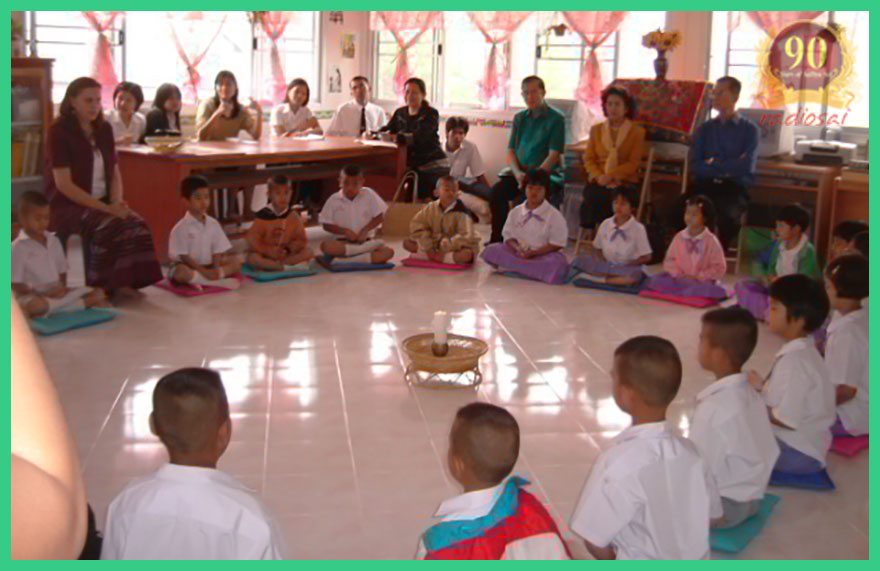 |
| Grade 1 students in meditation - observed by visitors from Ministry of Education |
Group Activities offer experiential learning. “If you tell me, I will forget. If you show me, maybe I will remember. If you involve me, I will understand.” Group Activities are the involvement. If we consider how much of a child’s life is spent sitting on a chair behind a desk, we will see the necessity to introduce different activities. It is also the practical part, as much of learning is purely theoretical these days. Therefore children should get the opportunity to have hands-on experience. Apart from emphasising activities, the group part is also very important. Working and playing together as a group helps develop social skills and team spirit among children.
Although the main emphasis is not on academic achievement, it has emerged as a natural outcome of the system that keeps children joyful, centred and calm. Today, the Sai School of Thailand has received many awards for academic achievement and has had outstanding success in sending students to university. Numerous alumni are studying at the best universities in Thailand.
Spirituality, Sustainability, Self-Sufficiency – Sai Values a Way of Life on School Campus
Apart from being considered a model school by the Ministry of Education, the Sathya Sai School has also been selected as a model school by the Ministry of Energy for its achievements in organic farming and alternative energy. The school produces all its own rice and most of its vegetables apart from producing energy from solar, wind and water. It makes its own bio-diesel and bio-gas. The long-term plan is to become totally self-sufficient. The entire school including all the students and teachers help plant and harvest rice! The school has received literally hundreds of awards over the last 20 odd years including the most prestigious awards from His Majesty the King of Thailand and the Crown Princess. They have so many visitors from universities, schools, government offices and the private sector that they have to limit the amount of visitors to 2000 a month!
Apart from being considered a model school by the Ministry of Education, the Sathya Sai School has also been selected as a model school by the Ministry of Energy for its achievements in organic farming and alternative energy. The school produces all its own rice and most of its vegetables apart from producing energy from solar, wind and water. It makes its own bio-diesel and bio-gas. The long-term plan is to become totally self-sufficient. The entire school including all the students and teachers help plant and harvest rice! The school has received literally hundreds of awards over the last 20 odd years including the most prestigious awards from His Majesty the King of Thailand and the Crown Princess. They have so many visitors from universities, schools, government offices and the private sector that they have to limit the amount of visitors to 2000 a month!
Institute of Sathya Sai Education (ISSE Thailand) for the Global Community
In accordance with Bhagawan Baba's instructions to Dr. Art-ong Jumsai to start and Institute for people around the world, in July of 1998 the Institute of Sathya Sai Education (Thailand) was established on the premises of the Sathya Sai School. The first diploma course was held in 1998. Since then they have conducted 32 such courses, each course is for the duration of approximately 9 weeks. So far 338 people from 52 countries around the world have graduated from the Institute. Students have come from: Argentina, Australia, Brazil, Canada, China, Columbia, Cambodia, Croatia, Ecuador, England, Estonia, Fiji, France, Germany, Hawaii, Holland, Hong Kong, India, Indonesia, Iran, Ireland, Israel, Italy, Japan, Kazakhstan, Kuwait, Laos, Malaysia, Myanmar (Burma), Mauritius, Mexico, Morocco, Nepal, Netherlands, New Zealand, Oman, Paraguay, Peru, Philippines, Qatar, Singapore, Slovenia, South Africa, Scotland, Spain, Sri Lanka, Sweden, Switzerland, Thailand, USA, Uganda and Venezuela.
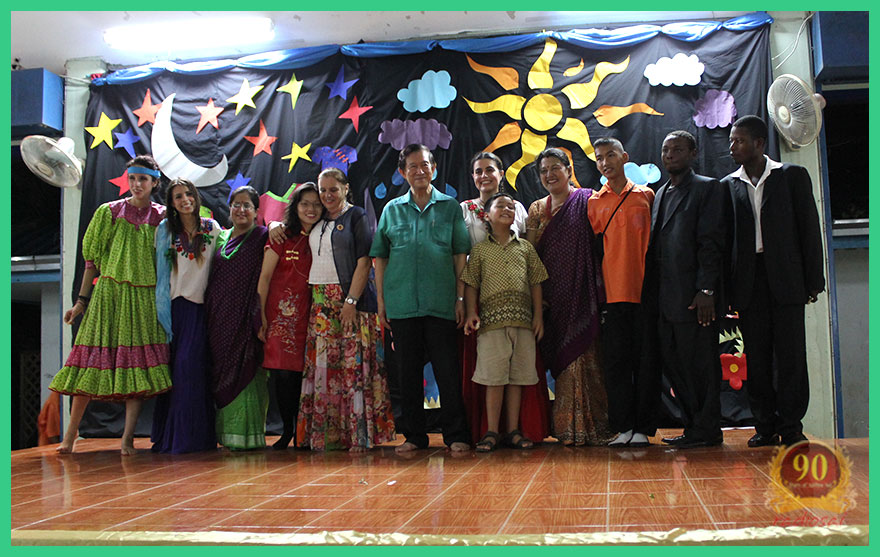 |
| Dr. Art-ong Jumsai & Mrs. Angela Loraine with ISSE students - 2010 |
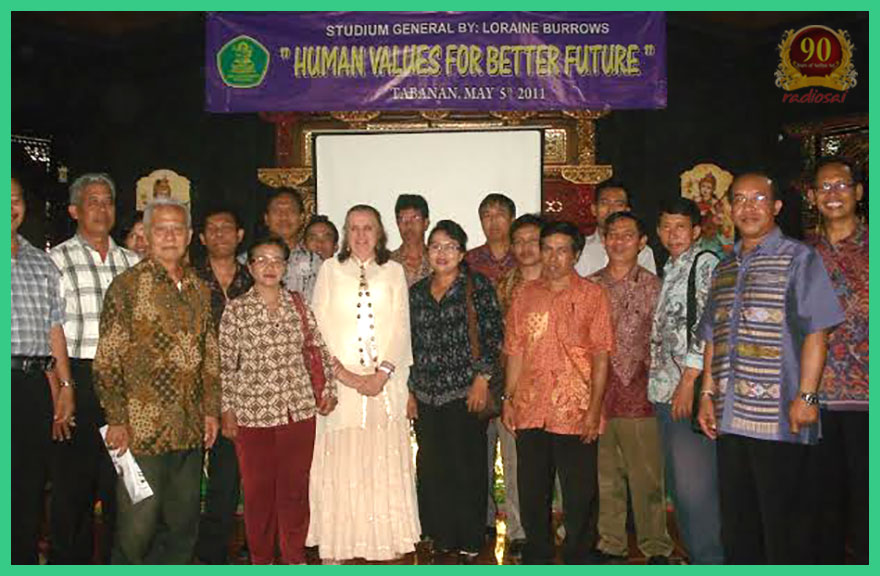 |
| Human values for better future seminar Bali Indonesia - 2011 |
Apart from teaching English and Education in Human Values at the Sathya Sai School, Loraine also lectures and conducts workshops for the Institute, and takes care of Foreign Affairs as they have so many visitors from other countries. Many groups of teachers, educators and ambassadors from various countries visit the school.
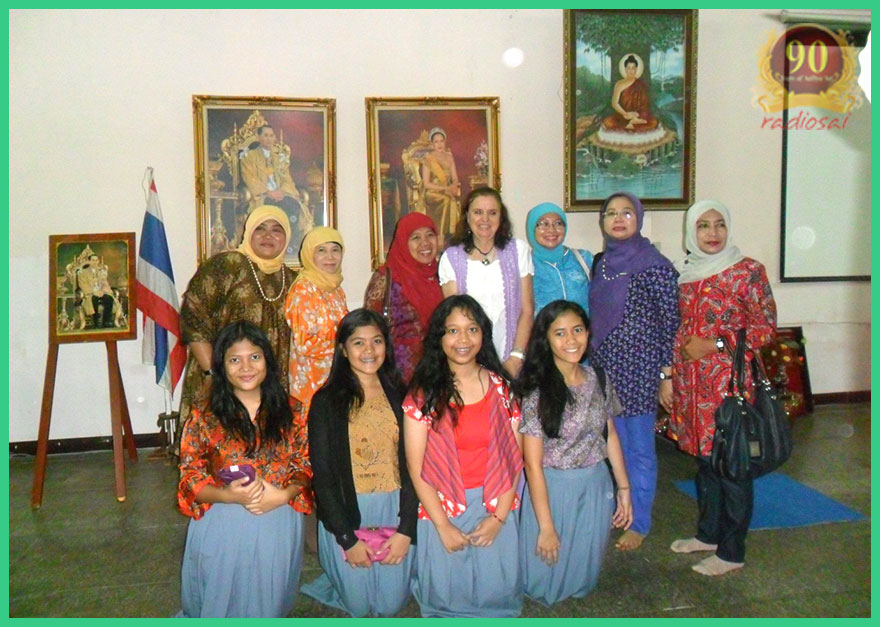 |
| Teachers from Indonesian Govt Schools visit SSS School to learn EHV |
Muslim Leaders Recognize the Universality of Sai Values
The Indonesian Education Ministry has sent several groups of government teachers on study tours to learn about Education in Human Values and how to implement it in their own classrooms. This is really Swami’s miracle, considering that Indonesia has the largest Islamic population in the world and all the teachers that come for training are Muslims. Loraine also travels to other countries a lot as there is such a need worldwide for values education. Since the early 1990’s until present, she has spoken and conducted seminars and workshops in Australia, Bhutan, Fiji islands, Greece, Hong Kong, India, Indonesia, Italy, Japan, Kazakhstan, Korea, Laos, Malaysia, Mauritius, Morocco, Nepal, New Zealand, Oman, Philippines, Russia, Singapore, Spain, Sri Lanka, Taiwan, Thailand, UK, USA and Vietnam.
The Indonesian Education Ministry has sent several groups of government teachers on study tours to learn about Education in Human Values and how to implement it in their own classrooms. This is really Swami’s miracle, considering that Indonesia has the largest Islamic population in the world and all the teachers that come for training are Muslims. Loraine also travels to other countries a lot as there is such a need worldwide for values education. Since the early 1990’s until present, she has spoken and conducted seminars and workshops in Australia, Bhutan, Fiji islands, Greece, Hong Kong, India, Indonesia, Italy, Japan, Kazakhstan, Korea, Laos, Malaysia, Mauritius, Morocco, Nepal, New Zealand, Oman, Philippines, Russia, Singapore, Spain, Sri Lanka, Taiwan, Thailand, UK, USA and Vietnam.
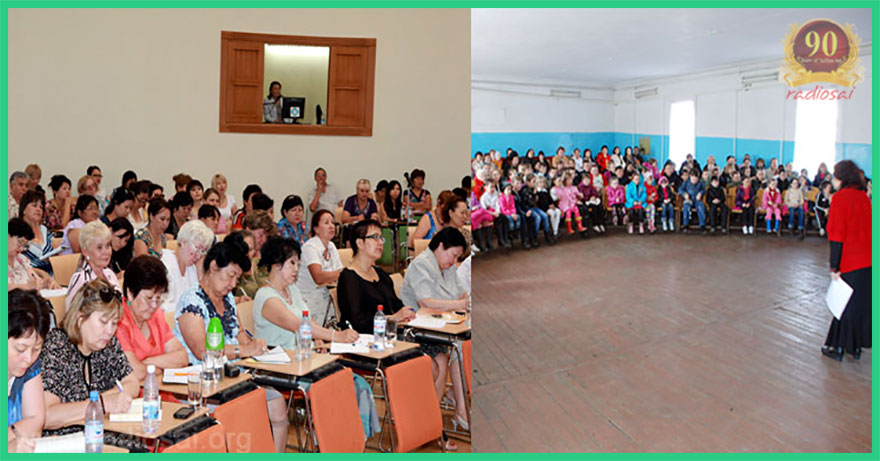 |
| Seminar on Human Values in Kazakhstan organised by the Sai Organisation |
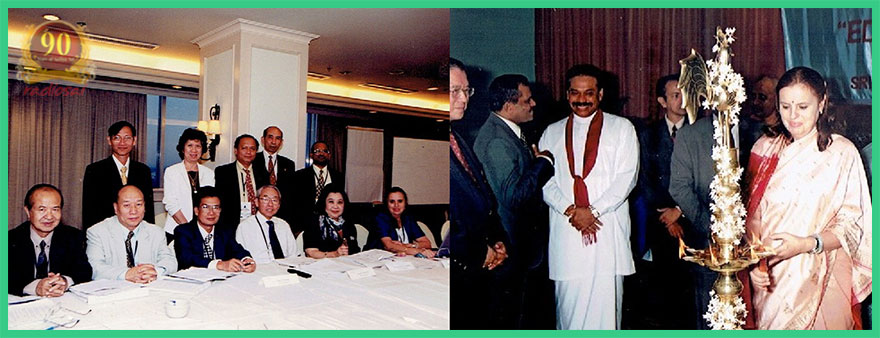 | |
| A meeting with Ministers, Deputy Ministers and Secretaries of Education from Thailand, Laos, Cambodia and Vietnam during a discussion at UNHABITAT Regional Consultations on Value-Based Water Education on 29th November - 2nd December 2003 in Manila, Philippines | Opening of seminar on educare at Sri Lanka with the President of Sri Lanka, His Excellency Mahinda Rajapaksa |
The two countries that have taken SSEHV as part of their education system are Kazakhstan and Bhutan. Dr. Art-ong Jumsai and Loraine travelled many times to Kazakhstan and conducted training for teachers all over the country. They were invited by the First Lady of Kazakhstan and worked closely with her for several years. The First Lady has been to see Swami on several occasions and although Kazakhstan is a Muslim country, Sathya Sai Education in Human Values has been incorporated into the national educational system.
A special agreement was signed between the Government of Bhutan and Thailand to train all the school teachers in Bhutan in Sathya Sai Education in Human Values. Numerous seminars were conducted for school principals and teachers. During 2010, two large groups of potential teacher-trainers from Bhutan (76 in all) came to study intensive shortened courses in Sathya Sai Education in Human Values of two weeks duration at the Institute of Sathya Sai Education in Thailand. As a completion of the agreement, in January 2011 Dr. Art-ong and Loraine spent one week in Bhutan completing the training of the teacher trainers.
Values & Water Sanitation – UN-HABITAT Comes Calling
In 2006, UN-HABITAT contacted the ISSE and asked them to help them conduct seminars and workshops in many countries in Asia, as they are very concerned about the world’s water situation. They realised that the only way to bring about any change is to bring values into Water Education, so that children and teachers see the true value of water and live their lives according to human values.
In 2006, UN-HABITAT contacted the ISSE and asked them to help them conduct seminars and workshops in many countries in Asia, as they are very concerned about the world’s water situation. They realised that the only way to bring about any change is to bring values into Water Education, so that children and teachers see the true value of water and live their lives according to human values.
Dr. Art-ong Jumsai and Loraine conducted seminars on Human Values in Water, Hygiene and Sanitation in Sri Lanka, Nepal, Bhopal (India), Indonesia, Thailand, Laos and Cambodia. The seminars were very well received and the teachers pledged to bring Human Values into their classrooms.
 | |
| Lecture on Human Values based Water, Sanitation and Hygiene programme, Jakarta, Indonesia | Lecture on Human Values based Water, Sanitation and Hygiene programme, Kathmandu, Nepal |
They also held ten one-week courses at the Sathya Sai School for teacher-trainers for Values-based Water, Hygiene and Sanitation classes. Over a hundred teacher-trainers from all parts of Asia and some other countries came and attended these special training sessions.
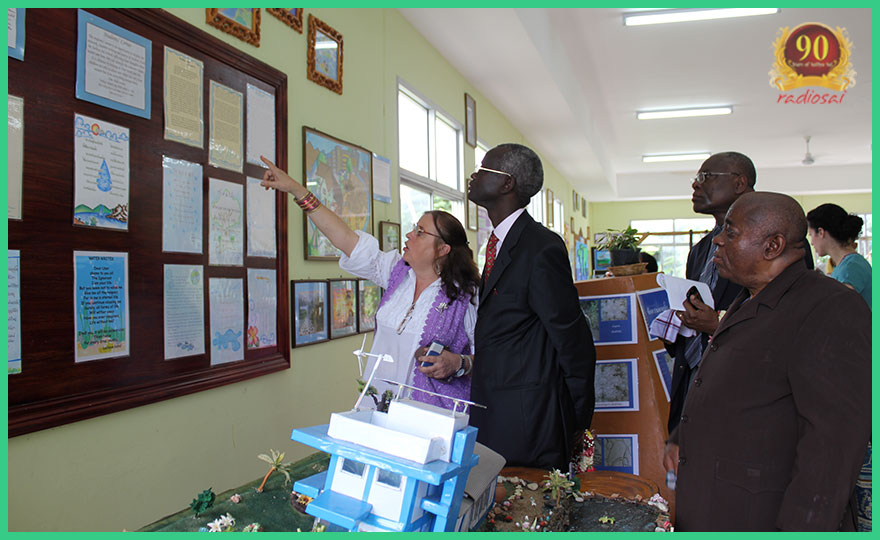 |
| Human Values the core of all human existence, including water - Interacting with UNESCO representatives from Angola, Cameroon, Congo, Egypt, Gabon, Senegal, & Tanzania |
Along with teaching and lecturing, Loraine has been inspired to write several books on Sathya Sai Education in Human Values, including books on Lesson Plans and integration of values into curricular subjects. She was also asked to write two books on Values in Water Education as part of the work with UN-HABITAT. Many of the books have been translated into different languages such as French, Spanish, Japanese, German, Indonesian and many others. Apart from books, Swami has also inspired her to write dozens of value songs for children which have also been translated into many languages. She feels very good when visiting different countries and she hears children singing these songs in their own languages!
The Greatest Gift of All – To Be His Flute
“We can look back at our lives and think that we have achieved a lot, but it is all an illusion! We are purely instruments in the Divine Hands of Bhagawan. It is simply His Grace that allows us to do His Work.” Loraine remembers once Swami telling the story of the gopis and the Murali (flute). He said: “Once the gopis found the Murali (flute) in the forest and they picked it up and spoke to it: ‘Oh! Murali, tell us your secret! What great things have you done to have such grace, that the Lord Himself puts you to His lips and plays a melody through you? And when He is not playing music He keeps you in His waistband! Oh! Murali, tell us your secret!’ At that moment Radha was passing by and she saw the dilemma of the gopis. She said: ‘Sisters, just look at this Murali, what it was before it became the Murali? It was only a piece of bamboo. It had to be cut with an axe, scooped out and made hollow with a knife and holes burnt with fire. Only in a state of complete emptiness can the Lord play His Divine Melody through it.” Swami then looked at all of the people listening, and said: “I want you all to become my Muralis!”
“We can look back at our lives and think that we have achieved a lot, but it is all an illusion! We are purely instruments in the Divine Hands of Bhagawan. It is simply His Grace that allows us to do His Work.” Loraine remembers once Swami telling the story of the gopis and the Murali (flute). He said: “Once the gopis found the Murali (flute) in the forest and they picked it up and spoke to it: ‘Oh! Murali, tell us your secret! What great things have you done to have such grace, that the Lord Himself puts you to His lips and plays a melody through you? And when He is not playing music He keeps you in His waistband! Oh! Murali, tell us your secret!’ At that moment Radha was passing by and she saw the dilemma of the gopis. She said: ‘Sisters, just look at this Murali, what it was before it became the Murali? It was only a piece of bamboo. It had to be cut with an axe, scooped out and made hollow with a knife and holes burnt with fire. Only in a state of complete emptiness can the Lord play His Divine Melody through it.” Swami then looked at all of the people listening, and said: “I want you all to become my Muralis!”
“The greatest gift that Swami has given me is the chance to be a teacher at His school. It is an honour to work with children and see them blossom into beautiful flowers. I have learnt that there is no such thing as a bad child! Certainly, some children have bad habits and characteristics but these can change through the practice of the five human values, especially love. Not every child is good at mathematics, science or languages, but every child is good at something, and it is His Grace to be able to help children find their potential. Perhaps some are musical, artistic or even good at cooking, but every child has something special and through His schools children are allowed to excel and find their true selves.
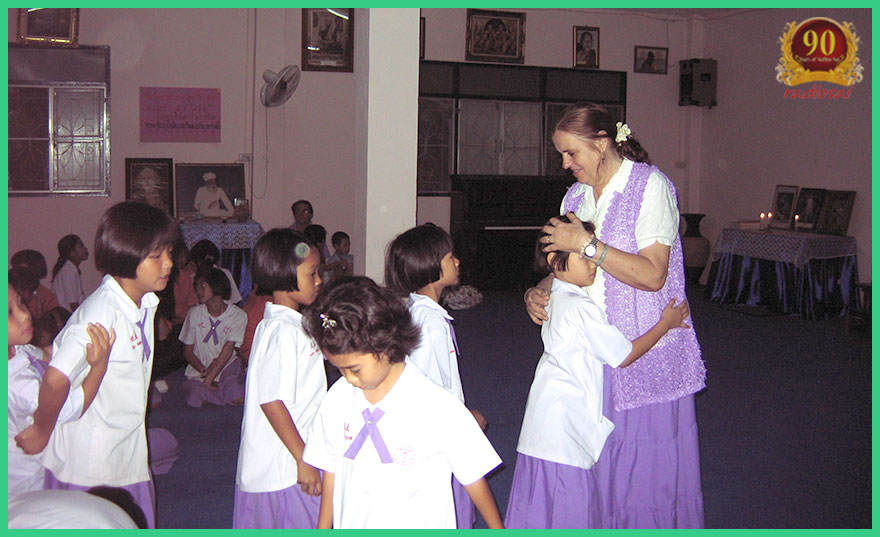 |
Why else is it such a gift? Because as He said back in 1983 “If you are a teacher of Education in Human Values, you have to practice everything that you teach.” It is a continual growing and churning process. We all go through this churning, it is part of the game, and we cannot escape it. I went through a period of nine years when Swami did not speak to me; they were very difficult years where I underwent many tests. But in retrospect they were some of the most important years of my life because they taught me to go within and find Swami there. When He did call me after nine years, He said many things, but at the end He filled my hands with vibhuthi and said, “Now go, and do good work in Thailand.”
After many years, as her work started to expand to other countries, Loraine wanted to check with Swami that He was happy with this. She had an opportunity to ask when she went one time to Prasanthi with a Thai Buddhist nun and Swami called them for an interview. “He gave me the honour of translating from Thai into English, and English into Thai, (as if the Lord needs a translator! He was just giving me the chance!) At the end of the interview I asked Swami: “Swami, what about my work?” Swami looked at me with a beautiful smile and said: “Your work, Swami is very, very, very, happy!” What more can one ask for in this life?”
Students' Testimonies (Sathya Sai School - Thailand)
|
 |
|
 |
|
 |
|
|
 |
|
 |
|
 |
|
 |
|
 |
|
 |
|

Комментариев нет:
Отправить комментарий